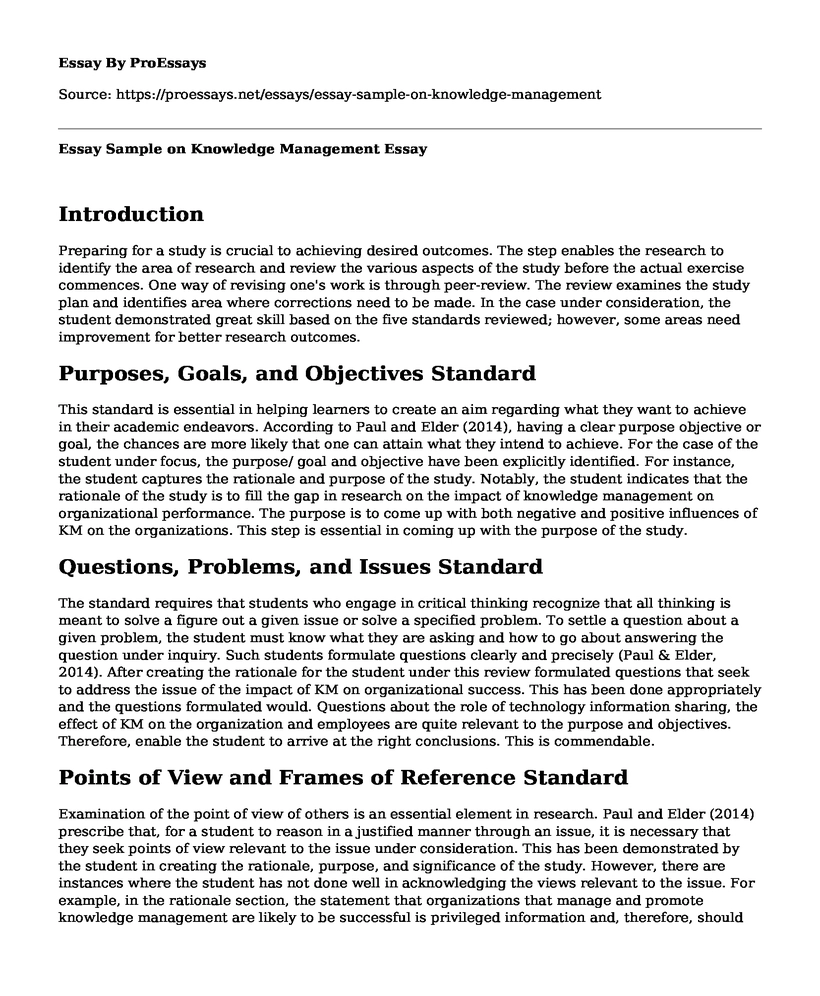Introduction
Preparing for a study is crucial to achieving desired outcomes. The step enables the research to identify the area of research and review the various aspects of the study before the actual exercise commences. One way of revising one's work is through peer-review. The review examines the study plan and identifies area where corrections need to be made. In the case under consideration, the student demonstrated great skill based on the five standards reviewed; however, some areas need improvement for better research outcomes.
Purposes, Goals, and Objectives Standard
This standard is essential in helping learners to create an aim regarding what they want to achieve in their academic endeavors. According to Paul and Elder (2014), having a clear purpose objective or goal, the chances are more likely that one can attain what they intend to achieve. For the case of the student under focus, the purpose/ goal and objective have been explicitly identified. For instance, the student captures the rationale and purpose of the study. Notably, the student indicates that the rationale of the study is to fill the gap in research on the impact of knowledge management on organizational performance. The purpose is to come up with both negative and positive influences of KM on the organizations. This step is essential in coming up with the purpose of the study.
Questions, Problems, and Issues Standard
The standard requires that students who engage in critical thinking recognize that all thinking is meant to solve a figure out a given issue or solve a specified problem. To settle a question about a given problem, the student must know what they are asking and how to go about answering the question under inquiry. Such students formulate questions clearly and precisely (Paul & Elder, 2014). After creating the rationale for the student under this review formulated questions that seek to address the issue of the impact of KM on organizational success. This has been done appropriately and the questions formulated would. Questions about the role of technology information sharing, the effect of KM on the organization and employees are quite relevant to the purpose and objectives. Therefore, enable the student to arrive at the right conclusions. This is commendable.
Points of View and Frames of Reference Standard
Examination of the point of view of others is an essential element in research. Paul and Elder (2014) prescribe that, for a student to reason in a justified manner through an issue, it is necessary that they seek points of view relevant to the issue under consideration. This has been demonstrated by the student in creating the rationale, purpose, and significance of the study. However, there are instances where the student has not done well in acknowledging the views relevant to the issue. For example, in the rationale section, the statement that organizations that manage and promote knowledge management are likely to be successful is privileged information and, therefore, should be cited accordingly because it appears to be a conclusion that has been based on research done elsewhere. This is necessary avoid any cases of plagiarism. The viewpoint of the significance of the study also does not relate to how the study would benefit organizations. Instead, it talks of reviewed literature and how such literature creates a research gap.
Ethical Reasoning Ability Standard
A student who thinks critically must demonstrate superior ethical ability in their academic engagements. These students learn to identify ethical issues that may affect their educational ventures and reason well through the ethical questions, problems plus situations (Paul & Elder, 2014). For the case under review, the students have acknowledged the significance of Brazilian, Chinese and American culture in their research process. By so doing, the student demonstrates that the study would be free from personal biases since the culture of the target population has been recognized as an essential variable in the study. This is a sign of academic maturity on the part of the student.
Conclusion
Overall, the student has done well in preparing the research plan. The feedback assessed the performance of the student in purpose/objectives standard, ethics of research, and acknowledgment of the study's relevant views. Another standard included is issue identification. However, there are a few areas that need refinement. These areas include citations when utilizing the positions of others as students seek to document relevant views, and also clarifying the significance of the study as it pertains to the study that is being proposed.
References
Paul, R., & Elder, L. (2014). Critical thinking: Concepts & tools. Tomales, CA: Foundation for Critical Thinking.
Cite this page
Essay Sample on Knowledge Management. (2022, Nov 28). Retrieved from https://proessays.net/essays/essay-sample-on-knowledge-management
If you are the original author of this essay and no longer wish to have it published on the ProEssays website, please click below to request its removal:
- Essay Example: PowerPoint and a Student's Academic Performance in the Classroom
- Should We Have Same-Sex Schools: Annotated Bibliography
- Self-Reflection Report: Academic Interest in Journalism
- Mental Models and Theory of Constraints in Perception Paper Example
- A Disappointment I Did Not Anticipate Essay
- Essay Sample on Developmental Psychology: Parenting Related to Development of Children
- Free Essay Example on Addressing Nursing Shortage: Educational Background, Expertise







